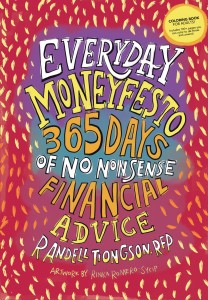10 Money Principles Kids Should Learn
By Randell Tiongson on February 8th, 2016
Albert Einstein and personal finance – the two are rarely used in the same sentence. But the man behind the theory of relativity said one of the most basic yet essential quotes when it comes to money – “Compound interest is the 8th wonder of the world. He who understands it, earns it; he who doesn’t, pays it.” Well, it isn’t really clear if Albert Einstein actually said it but compounding interest is really a cool thing.
Compound interest is interest added on interest. A 10% yearly interest on Php 100 is not Php 10 every year. This is because of compound interest. In the second year, the Php 100 grows to Php 110 and 10% of that is Php 11. When it comes to finances, the earlier you start saving and investing, the higher the potential of compound interest because of the longer timeline. This means younger folks have, if they start saving and investing early, the upper hand when it comes to finances. This is where parents come in.
Personal finance, even just the basics, should be taught to kids and teenagers. To make this more fun, you can give bonuses and incentives from time to time, such as doubling the amount of money your kids save in X months or giving your teenagers a stock market challenge where the one with the most profits earns a prize.
Aside from compound interest, what are other money principles kids should learn? Look no further. MoneyMax.ph, a Philippine comparison portal for financial products such as loans and credit cards, created an infographic on 10 money principles kids should learn:

From creating proper money habits to practicing both saving and earning, the 10 principles above are sure to give your children a head-start when it comes to their finances. The earlier your kids start, the more time they have to learn, practice, and live the above-mentioned lessons for a healthier financial life for both them and you, as their parents.
To share what we do, my wife and I have been teaching our kids 3 basic money principles whenever they get some money: SAVE, SPEND, GIVE — principles that are truly important life skills for them to have.
Let us teach our children be wise, to love others and most importantly to love God and they will be set for life.
Train up a child in the way he should go; even when he is old he will not depart from it. (Proverbs 22:6, ESV)
—————–
Get a copy of my inspiring book and be encourage with your journey towards financial freedom!

Everyday Moneyfesto: 365 Days of No Nonsense Financial Advice is a unique book that focuses on financial wisdom. It is a book that will guide you, motivate you and inspire you on a daily basis to help you achieve financial peace.
Other than my daily advices, the book also shares the financial wisdom from the biggest names like Francis Kong, Bo Sanchez, Marvin Germo, Efren Cruz, Chinkee Tan, Coney Reyes, Miriam Quiambao, Rex Mendoza, Ardy Abello, Edric Mendoza, Salve Duplito, Alvin Ang, Dennis Sy, Jayson Lo and many more!
This is a unique book where you can also show your creativity with over 100 pages which you may want to color, featuring artwork by Rinka Romero-Sycip.
Be one of the first to get a copy of this life-changing and empowering book for only P300.00 per book (compact edition) and for a limited period, shipping is for free for Metro Manila orders. For provincial orders, please add P100.00.
To order, follow these easy steps:
- Deposit payment to BPI 0249-1113-09 under John Randell Tiongson
- Send a photo of the deposit slip to michael@randelltiongson.com along with your complete address and contact number.
- Wait for your book/s in a couple of days.
Supporting your family while saving for retirement
By Randell Tiongson on August 19th, 2015

Q: Hi Randell, I’m a regular employee in my late 20s. Having read your articles, I know it’s important to save for retirement early, but I also want to support my family (my parents and my younger siblings) financially. Is it possible to do both? –Inez, via Facebook
A: I’m glad that you’re looking out for your financial future while still being concerned about your family’s. In such a close-knit family culture like the one we have here in the Philippines, it’s natural to want to help out. But oftentimes, in their desire to help, a lot of people ignore their own financial health – and that’s not good. Here are a few steps to take if you want to support your family and save for your own future:
1. Put the mask on yourself first. If you’ve been on any flight (and you actually pay attention to the flight attendants’ pre-flight instructions), you know that when the oxygen masks drop, you’re supposed to put the mask on yourself first before you help put the mask on others. It’s the same for your finances; before you can help anyone else, help yourself first. Do you have an emergency fund? Is a portion of your salary going towards retirement already? Are you free from high-interest debt like credit cards? Then you can step up and contribute to your family. If not, take care of your own finances first.
2. Get insurance. Your contributions are vital to your family, so it makes sense to protect yourself with life insurance in case you’re unable to work. If you budget concerns and investments is not yet a priority, look at term life insurance plans, which provide coverage for serious illnesses and death for a certain period of time. You may also consider health insurance or HMOs if health is a major concern for you.
3. Know your family’s financial situation inside and out. Knowing your family’s financial capabilities will help you keep better control of your own finances. What do they need help with? How much do they need to pay whom? This may not be an easy conversation to have, but it’s important so that you don’t overextend yourself, and they don’t become reliant on you at the expense of your own future. When you know how much money they truly need, you can measure it against what you can provide as assistance, and you can provide for them while saving for yourself.
4. Set boundaries. Exactly what monetary help does your family need? How much will they need from you monthly, and for how long? What is the maximum you can provide for them? What are their financial goals? Setting these markers down will ensure that you stay on your financial track while still being able to help your family. When you help, make sure it is not encouraging the habit of dependency and entitlement.
5. Teach them good financial habits. Like the old saying about teaching a man how to fish, teaching your family good financial habits will be much more help to them in the long run that simply giving them money. Help them set a budget so they can meet their expenses, or assist them with finding money-making opportunities so that they can sustain themselves with minimal help from you. This way, they can have their own sources of income other than just you – freeing your finances up so you can save more, build your wealth, and be in a better position to help them out if more financial setbacks arise.
Discussing family finances is not the easiest thing to do, but it’s very important if you want to help your family while still helping yourself. Improve your finances and get yourself on solid ground before you commit your resources to helping out. It’s important to be there for your family, and by following the steps above, you can ensure a good future for yourself while getting your loved ones on better financial footing.
What does the bible say about these things?
We should honor our parents — “Honor your father and your mother, that your days may be long in the land that the LORD your God is giving you. (Exodus 20:12, ESV). It was further reinforced in Ephesians 6:2 —“Honor your father and mother” (this is the first commandment with a promise).
However, the bible is likewise clear about the obligations of a parent — Here for the third time I am ready to come to you. And I will not be a burden, for I seek not what is yours but you. For children are not obligated to save up for their parents, but parents for their children. (2 Corinthians 12:14, ESV).
Seek wisdom with these things… be in faith and be a good steward of your finances lest you your children may end up having the same burden as you have for your parents.
A good man leaves an inheritance to his children’s children, but the sinner’s wealth is laid up for the righteous. (Proverbs 13:22, ESV)
5 Red Flags of a Scam
By Randell Tiongson on August 14th, 2015
A few weeks ago I posted about scam warning. Between then and now, the SEC has issued no less than seven advisories urging people not to invest in other scams.
 At the risk of repeating myself, I’m not going to go into every single one of them to tell you why they’re scams. Instead, I’ll go over common the red flags that scream “SCAM!”. As always, if you’re offered an opportunity that seems too good to be true, it probably is; check against this list to make sure.
At the risk of repeating myself, I’m not going to go into every single one of them to tell you why they’re scams. Instead, I’ll go over common the red flags that scream “SCAM!”. As always, if you’re offered an opportunity that seems too good to be true, it probably is; check against this list to make sure.
- The company does not have license to offer and/or sell securities from the SEC.
Some scammers are getting smarter and registering their company to the SEC, which gives them the appearance of legitimacy. Here’s the thing – just because a corporation is registered with the SEC, it doesn’t mean they can take money from the public for investments.
SEC registration as an investment taker and SEC registration as a company are two different things. So if you ask them for SEC registration and they show you that they’re registered as a company, ask to see their registration that authorizes them to take investments. If they don’t show you anything, or they do show you something that looks completely fake, get out of there.
If you want to be extra sure, you can also do some research of your own by checking all the entities registered to take investments with the SEC here.
- You’re promised “no risk” and “high returns”.
According to the US SEC, “promises of high returns, with little or no risk, are classic warning signs of fraud.” For reference, as of last week, the top UITFs in the country gave just over 10% returns year-on-year (August 7, 2014 to August 7, 2015). One of the scams the Philippine SEC issued an advisory against promised 150% returns within 30 to 45 days. 150% in such a short time might sound really good, but the only guarantee there is that you’ll lose 100% of your money to a scam.
There’s no such thing as a free lunch, and there’s no such thing as a risk-free investment. I understand that it’s easy to be tempted by what seems to be a slam-dunk opportunity, but you have to keep both eyes open to avoid being scammed by unscrupulous individuals. Know the risks involved; if they keep saying there’s “no risk”, it’s most likely a scam.
- You don’t know what you’re investing in.
If you can’t name exactly what you’re putting your money in, it’s a huge red flag. Look at it this way; when you buy a mutual fund, you know you’re buying shares of an SEC-registered company. When you put P1,200 in Grandtime Automobile, for example, what are you putting your money in? Scammers deceive people by focusing on huge unrealistic gains instead of the “product” that you’re supposed to be selling. If, after talking to them, you still don’t know exactly what investment opportunity is, it’s a red flag.
Albert Einstein once said, “If you can’t explain it simply, you don’t understand it well enough.” And as I’ve always said, if you don’t understand something, don’t put your hard-earned money in it, because it’s likely that you’ll lose it.
- The focus is on recruitment, and not on the product.
Legitimate MLM schemes focus on selling a product to make money. Think Avon and Tupperware; these are MLM programs with tangible products. If what you’re being recruited to is more focused on recruiting others rather than actually selling a product, then it’s a red flag. Because in that scenario, what’s for sale is you. (And the people you’re supposed to recruit.)
If the focus is much more on recruitment (and there’s an entry fee), this can also explain why some people are getting paid. When someone says “It’s legit; look, I got my money already!”, it’s more than likely that the money came from entry fees from new recruits, according to the US SEC, instead of product sales. And when that’s the case, the drive to get new recruits is strong because that’s the only source of money for the scam. Check out the Direct Selling Association of of the Philippines for a list of legitimate multi-level marketing companies.
- There’s pressure to spend money right now.
It’s human nature to not want to miss out on anything. Scammers prey on this instinct by insisting that the opportunity they’re offering you is limited, and if you don’t buy in right now, you’ll never have the chance again.
Legitimate businesses will give you some time to think about whether you want to make an investment or not. Scams will insist you pay money now, and will try to blind you with outrageous promises just so they can get you to pay without thinking too hard about it. If you’re feeling pressure or being forced to buy or invest, it’s a red flag; make sure you have the time to step back and do your research before you make a decision.
Investing is one of the best ways to secure your financial future; however, you should always make sure that the opportunities you invest in are legitimate. Educating yourself on the different investment vehicles and their opportunities will ensure that you invest your money wisely.
If you think you’ve encountered a scam, report to the Enforcement and Investor Protection Department at (02) 584-6337 or call the police if it’s an emergency situation.





